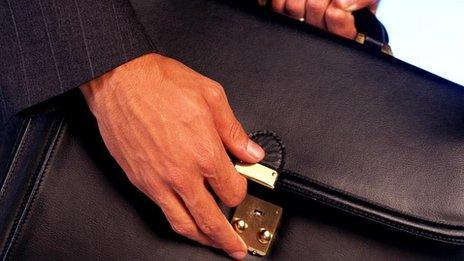Ministers 'given Trojan Horse schools warning in 2010'
- Published
Tim Boyes, head of Queensbridge School, said he had warned ministers
The Department for Education was warned in 2010 that Muslim hardliners were trying to take control of Birmingham schools, a head teacher has claimed.
Tim Boyes, head of Queensbridge School, said he warned ministers three years before a letter alleging a "Trojan Horse" plot was sent to the council.
He said he described a "bloodless coup" at one school and "an alliance to destabilise the head" at another.
The DfE said the meeting with Mr Boyes was a "general policy discussion".
The publication in March of the leaked Trojan Horse letter - now widely assumed to be a forgery - led to substantial press interest and political action.
The anonymous and unverified letter claimed that there was a Trojan Horse conspiracy by a group wanting to impose a more hardline Muslim agenda on schools in the city.
Governance worries
The schools watchdog in England, Ofsted, launched inspections of 21 schools and Birmingham City Council announced two inquiries.
The DfE appointed Peter Clarke, the former national head of counter-terrorism, to investigate.
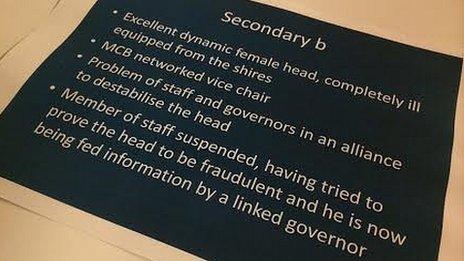
A presentation outlined "tactics for undermining heads" in five schools
But Mr Boyes - whose school is not being inspected by Ofsted - told BBC News he gave the department a presentation about the same threat in 2010, three years before the Trojan Horse letter was sent to Birmingham City Council.
"Back in 2010, I had a whole series of colleagues, other head teachers, who were reporting concerns about governance and things that weren't going well in their schools.
"Over 20 years... tensions and politics have exploded and as a result head teachers have had nervous breakdowns, they've lost their jobs, schools have been really torn apart," he said.
Slides from the presentation describe "staff and governors in an alliance to destabilise the head" at one secondary school.
"[A] member of staff [was] suspended, having tried to prove the head to be fraudulent."
At another secondary school it was claimed there was a plot to remove the head teacher, Mr Boyes said.
"Two governors with disproportionate impact… want to remove the head to have a Muslim head... [they are] working to undermine him. A known explicit intention the head lives with."
'Intimidating'
At a primary school, a dramatic increase in interest in joining the governing body was described. Previously, it had been "hard to recruit a single parent".
"At the start of a new year four vacancies generate 13 nominations," said Mr Boyes.
"The HT [head teacher] believed four to be from a specific co-ordinated group. Three were elected and the fourth came on as an LA [local authority] governor. This group were highly organised/nationally networked."
"The focal point was collective worship and a parent/public meeting was called. This was aggressive, intimidating... issues spread to swimming, other curriculum areas, meals, uniform."
Mr Boyes, one of about 800 national leaders of education, external, said he was not surprised the DfE did not act on his concerns.
"What I think the solutions might be are in the absolute opposite direction to government policy. Starting with New Labour, the reform of public services has been about creating markets and giving customers, end-users, choice and freedom.
"Because of the academy programme encouraging schools to opt out of local authority control, you've got increasing numbers of schools acting individually, on their own.
"We have schools that have now become increasingly isolated and segregated."
'Significant steps'
The DfE said in a statement that the meeting did take place but was a "general policy discussion".
It said: "There is absolutely no place for extremism in schools and this government has taken a number of significant steps to combat it.
"This meeting took place at the same time as the department was enhancing our due diligence and counter-extremism capability to make schools more aware of risks and to protect children.
"Since 2010 we have taken a number of steps to strengthen our capability to deal with extremism in schools, including setting up a dedicated counter-extremism unit within the Department for Education.
"We have also worked with Ofsted to strengthen inspectors' capacity to identify and report on extremism in schools."
Tristram Hunt, Labour's shadow education secretary, said this amounted to "gross negligence on the part of ministers".
He said: "Michael Gove refused to listen to the warnings about radical hardliners taking control of schools. His department has sat on these warnings for four years.
"Michael Gove's complacency has given rise to a constant stream of failings in our school system. Failings in the running of schools are not being spotted until it's too late."
- Published15 May 2014
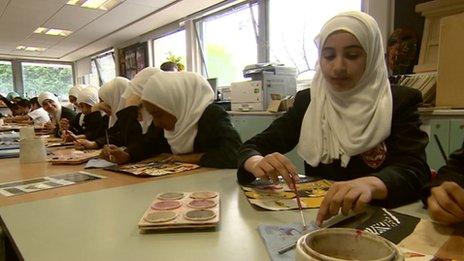
- Published16 May 2014
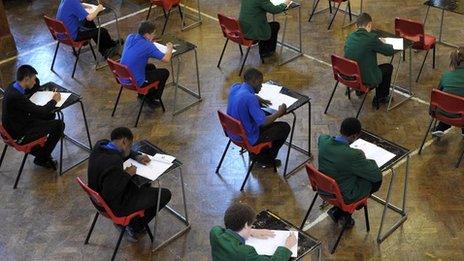
- Published14 May 2014
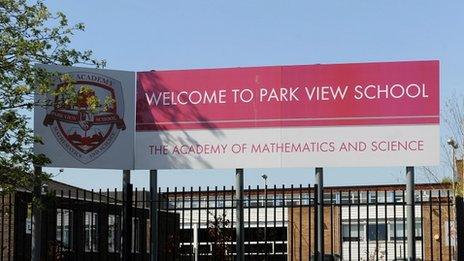
- Published10 June 2014
